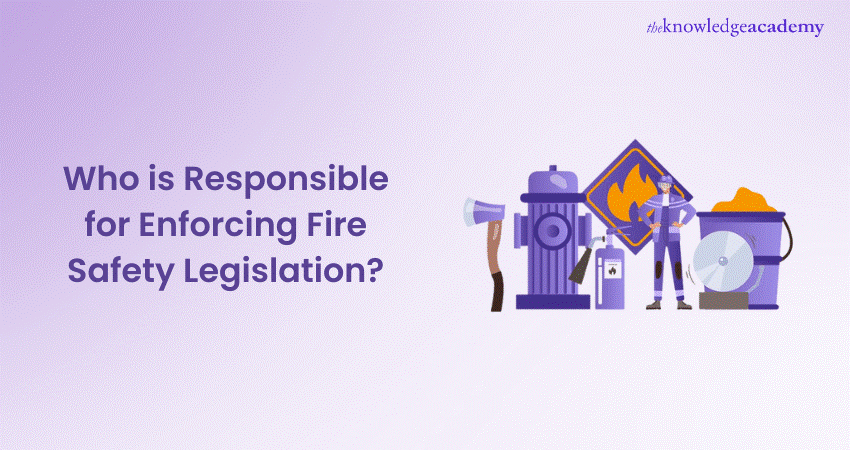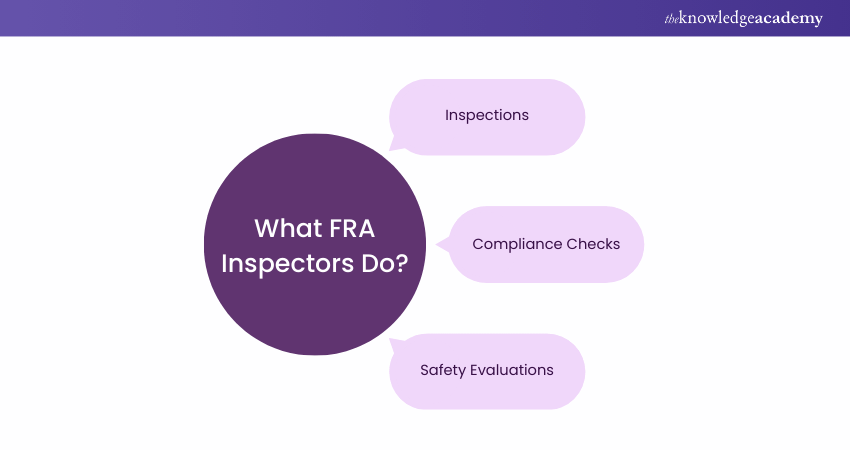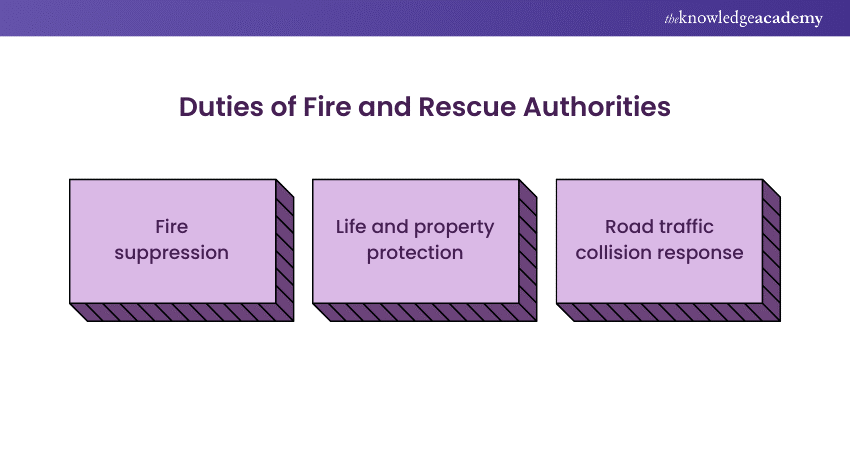We may not have the course you’re looking for. If you enquire or give us a call on +44 1344 203 999 and speak to our training experts, we may still be able to help with your training requirements.
Training Outcomes Within Your Budget!
We ensure quality, budget-alignment, and timely delivery by our expert instructors.

Fire Safety is a critical concern that affects almost everyone. The devastating consequences of fire incidents are catastrophic that impact lives, property, and various communities. Yet, despite the awareness, significant gaps persist in enforcing Fire Safety regulations. In this blog, we will delve into Who is Responsible for Enforcing Fire Safety Legislation in the United Kingdom. We will also shed light on various responsibilities of key stakeholders to ensure compliance and enhance Fire Safety measures. So, let’s journey down the rabbit hole of curiosity!
Table of Contents
1) Who is Responsible for Enforcing Fire Safety Legislation?
2) What Are the Responsibilities of the Person in Charge?
3) How Fire and Rescue Authorities Enforce Fire Safety Legislation?
4) What Are the Duties of an FRA Inspector?
5) Conclusion
Who is Responsible for Enforcing Fire Safety Legislation?
The new regulations are designed to enhance transparent collaboration among UK Fire Safety authorities. They are primarily enforced by the Fire and Rescue Authority (FRA) at the local level. If you are unsure where to find your FRA, you can reach out to your local fire service or check the National Fire Chief’s Council website for guidance.
FRA Inspectors have a critical role in upholding Fire Safety laws within buildings. Here’re their key responsibilities:

1) Inspections: Inspectors have the right to enter properties to identify the responsible parties and ensure their cooperation during the inspection process.
2) Compliance Checks: They assess whether the necessary Fire Safety information is shared as per guidelines. This includes reviewing building plans, installation documents for Fire Safety Systems, and maintenance records.
3) Safety Evaluations: Inspectors collect material samples to test for safety or flammability. If any materials are found to be unsafe, such as metal Cladding with unmodified Polyethylene filler or certain reactive chemicals and gases noted in fire risk assessments, they have the authority to take action. This may include ordering the materials to be dismantled, destroyed, or subjected to further testing.
What Are the Responsibilities of the Person in Charge?
The Responsible Person has several key duties to ensure fire safety within a building. Here are the main responsibilities outlined clearly:
1) Annual Fire Risk Assessment: The Responsible Person must ensure a thorough fire risk assessment is conducted annually, regardless of whether the building is open to the public for more than four days a week.
2) Staff Fire Safety Training: It is crucial that all staff are well-informed about fire safety procedures to make sure everyone knows how to act in case of an emergency.
3) Fire Extinguishers: The Responsible Person must ensure that there are enough fire extinguishers strategically placed in accessible locations throughout the building, with at least one extinguisher on each floor to manage small fires effectively.
4) Electrical Circuit Breakers: Installing electrical circuit breakers in areas with electrical equipment is advisable to prevent overheating issues, which can be a fire hazard.
5) Warning Signs: Clear and visible warning signs should be placed near areas with electrical equipment to alert people and discourage unnecessary contact, enhancing overall safety.
Join now to transform your workplace into a safer environment with our Health & Safety in the Workplace Training!
Requirements For Non-Domestic Premises
Individuals responsible for managing non-domestic premises, such as offices, hospitals, schools, transport terminals, and entertainment venues, have several key duties to ensure fire safety. Here are the main responsibilities:
a) Maintaining Fire Extinguishers: Ensuring a sufficient number of fire extinguishers are available and accessible throughout the premises to manage small fires effectively.
b) Installing Sprinkler Systems: Setting up sprinkler systems to provide automatic fire suppression in case of a fire, significantly reducing potential damage and risk.
c) Setting Up Smoke Detectors: Installing smoke detectors to provide early warning of a fire, allowing for timely evacuation and response.
d) Preventing Combustible Material Build-Up: Regularly check and prevent the accumulation of combustible materials to reduce fire hazards and enhance overall safety.
Sign up today to enhance your skills and ensure safety with our comprehensive Fire Marshal Training!
How Fire and Rescue Authorities Enforce Fire Safety Legislation?
Fire and Rescue Authorities play a vital role in keeping our communities safe. Here's a closer look at the essential duties they perform in day-to-day life:

1) Fire Suppression: FRAs are quick to respond to fires within their jurisdiction, deploying skilled firefighting personnel and resources. Their efforts aim to control and extinguish fires, thereby protecting lives and property.
2) Life and property protection: In the event of a fire, the primary focus of FRAs is to save lives and minimise property damage. This includes conducting rescue operations and implementing effective firefighting strategies to reduce any harm.
3) Road traffic collision response: FRAs also respond to road traffic accidents, where they provide critical assistance to those involved. Their trained teams use specialised equipment to ensure the safety and protection of accident victims.
4) Fire Prevention Enforcement: Additionally, FRAs enforce regulations like the Fire Safety Order by inspecting buildings to ensure they meet standards and that fire risks are minimised. Through these actions, FRAs aim to enhance public safety and decrease the occurrence and impact of fires.
Empower yourself with vital skills to protect lives and property – sign up for our Fire Risk Assessment Training today!
What Are the Duties of an FRA Inspector?
Fire and Rescue Authorities (FRAs) play a crucial role in managing fire safety within their jurisdiction. They majorly hold key responsibilities for ensuring public safety about fire hazards:
1) Inspection of Premises: FRA Inspectors meticulously assess premises to ensure they meet Fire Safety regulations. Their thorough checks help identify any potential risks or non-compliance issues.
2) Regulatory Compliance Check: Inspectors verify adherence to the Regulatory Reform (Fire Safety) Order 2005. They ensure that all Fire Safety measures are properly installed and fully operational.
3) Material Sampling: Inspectors may take material samples used on the premises to evaluate their safety and flammability. This helps determine if the materials meet safety standards.
4) Enforcement Actions: If materials are found to be unsafe, inspectors have the authority to order their destruction, dismantling, or further testing to reduce risks and ensure safety.
5) Record and plan review: Inspectors review records and fire risk assessment plans to check for compliance and suggest improvements.
6) Unscheduled Inspections and Cooperation: Although inspections are usually scheduled in advance, inspectors can also make surprise visits. During these inspections, they rely on the cooperation of the Responsible Persons at the premises to ensure the process is smooth and to address any issues found promptly.
Become proficient in safeguarding your environment with our Fire Extinguisher Training – Sign up today!
Conclusion
Understanding who is responsible for enforcing fire safety legislation is paramount for ensuring compliance. It helps mitigate fire risks and safeguard lives and property. By empowering Fire and Rescue Authorities with enforcement duties, these regulations play a crucial role in promoting fire safety. They help minimise potential hazards and ensure a safer environment for all.
Advocate safety and compliance with our comprehensive Fire Safety Training. Join today!
Frequently Asked Questions

Failing to meet fire safety standards can lead to catastrophic consequences, such as fines, legal action, and even imprisonment. Authorities may have the right to order the removal or alteration of unsafe materials. They can also close premises until safety requirements are met, putting lives and property at risk.

Fire protection is primarily a local responsibility, which is managed by local fire departments or fire services within specific jurisdictions. In certain cases, state and federal authorities may also be involved, such as during wildfires or incidents involving critical infrastructure or federal property.

The Knowledge Academy takes global learning to new heights, offering over 30,000 online courses across 490+ locations in 220 countries. This expansive reach ensures accessibility and convenience for learners worldwide.
Alongside our diverse Online Course Catalogue, encompassing 19 major categories, we go the extra mile by providing a plethora of free educational Online Resources like News updates, Blogs, videos, webinars, and interview questions. Tailoring learning experiences further, professionals can maximise value with customisable Course Bundles of TKA.

The Knowledge Academy’s Knowledge Pass, a prepaid voucher, adds another layer of flexibility, allowing course bookings over a 12-month period. Join us on a journey where education knows no bounds.

The Knowledge Academy offers various Fire Safety Courses, including Fire Warden Training, Fire Risk Assessment Training and Fire Safety Training. These courses cater to different skill levels, providing comprehensive insights into Fire Safety.
Our Health and Safety Blogs cover a range of topics related to Fire Safety, offering valuable resources, best practices, and industry insights. Whether you are a beginner or looking to advance your Fire Warden skills, The Knowledge Academy's diverse courses and informative blogs have got you covered.
Upcoming Health & Safety Resources Batches & Dates
Date
 Fire Warden Training
Fire Warden Training
Fri 7th Mar 2025
Fri 2nd May 2025
Fri 4th Jul 2025
Fri 5th Sep 2025
Fri 7th Nov 2025







 Top Rated Course
Top Rated Course



 If you wish to make any changes to your course, please
If you wish to make any changes to your course, please


